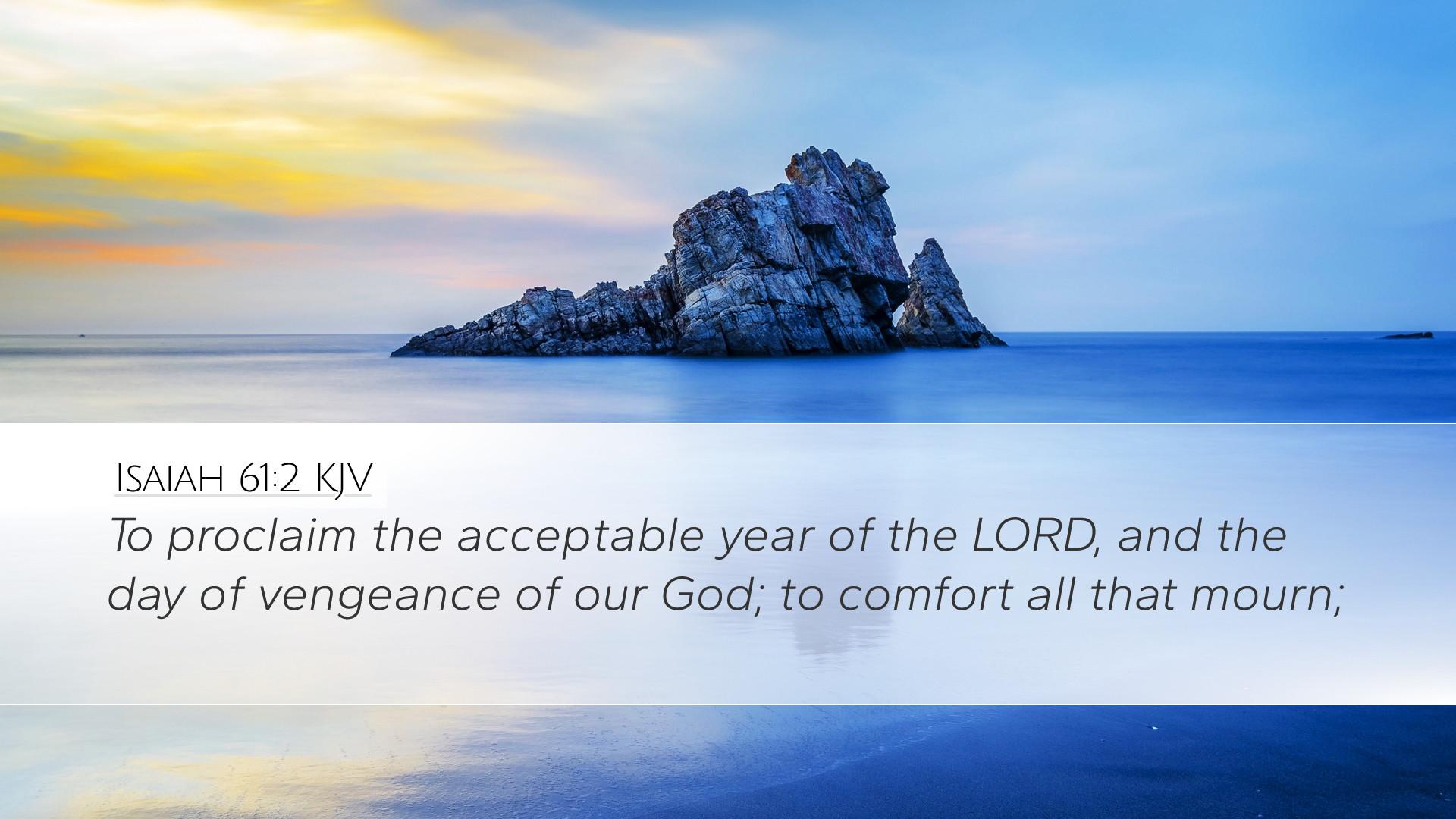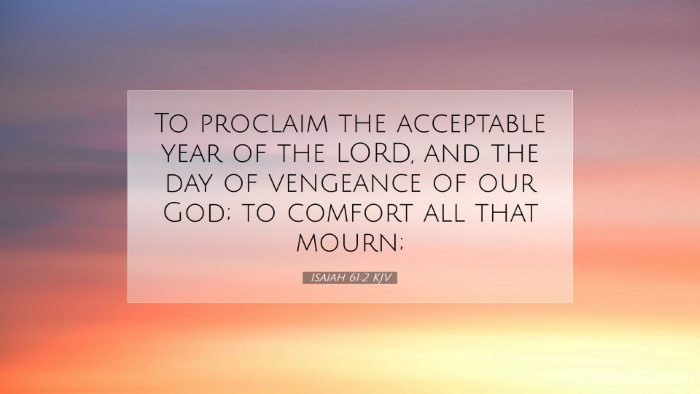Commentary on Isaiah 61:2
Isaiah 61:2 reads: "To proclaim the year of the Lord's favor and the day of vengeance of our God; to comfort all who mourn." This verse is a profound declaration that encapsulates both hope and judgment, illustrating the dual role of divine intervention in human affairs.
Contextual Background
The Book of Isaiah is often seen as a prophetic message addressing both the Israelites' current plight and their future restoration. Chapter 61 specifically speaks of the Messiah's mission, showing how God's anointed one would bring about salvation and transformation.
Insights from Commentators
Matthew Henry
Matthew Henry emphasizes the importance of proclamation in this verse. He notes that the term "proclaim" indicates the active role of the messenger in delivering God's message. Henry highlights two key aspects:
- The Year of the Lord's Favor: This refers to the Jubilee year, a time of liberation and restoration. Henry elucidates that this year symbolizes the grace and mercy God extends to His people, reclaiming what was lost and setting captives free.
- The Day of Vengeance: In contrast, this signifies God's righteous judgment against sin and oppression. According to Henry, this serves as a reminder of divine justice, which complements during the time of comfort and grace.
Albert Barnes
Albert Barnes offers a detailed look into the implications of the "day of vengeance." He points out that this phrase must not be overshadowed by the promise of comfort; rather, they coexist as necessary facets of God's character.
- God's Justice: Barnes articulates that God's vengeance is not arbitrary; it arises from His deep concern for justice and righteousness. This implies that those who have suffered under oppression will see a divine reckoning.
- Comfort for Mourning: He underscores that God's favor is not just for physical restoration but also brings emotional solace. The comfort extended to those who mourn is a heartfelt compassion that resonates throughout Scripture.
Adam Clarke
Adam Clarke provides a comprehensive analysis of the term "comfort." He argues that the Hebrew word used encompasses more than mere consolation. It signifies a profound restoration of hope and spirit for the bereaved.
- Spiritual Renewal: Clarke believes that the comfort God provides leads to a transformative renewal of the soul, encouraging believers to find strength amidst adversity.
- Affirmation of Divine Care: He also points out that this verse is an affirmation of God's enduring nature. It reassures believers that God is attentive to their distress and acts upon their behalf.
Theological Significance
This verse is rich in theological meaning, addressing key themes of suffering, hope, and redemption. The dual announcement of favor and vengeance reflects God's holistic approach to human sinfulness and divine grace.
Suffering and Redemption
Isaiah captures a poignant truth here — that suffering is often the precursor to redemption. The reality of mourning is not to be dismissed but is a stark reminder that the path to restoration may be fraught with pain. The proclamation of the "year of the Lord’s favor" assures the faithful that their suffering will not be in vain.
Hope in the Midst of Judgment
Diving deeper, the juxtaposition of favor and vengeance invites believers to hold onto hope during trials. In the Christian faith, this dichotomy is realized in the person of Jesus Christ, who embodies both the radical grace and the righteous judgment of God.
Application for Today
For pastors, students, theologians, and Bible scholars, Isaiah 61:2 provides a vital lens through which to view contemporary issues.
- Pastoral Care: Understanding the balance of comfort and judgment equips leaders to better minister to those in distress, affirming that God's love does not negate His justice.
- Social Justice: This verse challenges believers to advocate for the oppressed, resonating with God’s commitment to justice for those who suffer.
- Personal Reflection: Individuals are encouraged to seek God’s favor in their own lives, recognizing that while mourning may be iterative, it is often a precursor to deeper levels of faith and joy.
Conclusion
Isaiah 61:2 stands as a profound declaration of God's character and His plans for humanity. The dual roles of favor and vengeance encapsulate the heart of divine interaction with His creation, calling believers to stand firm in hope and action. Whether through pastoral ministry, personal application, or scholarly exploration, this verse invites continuous reflection on the profound mystery of God's redemptive work.


